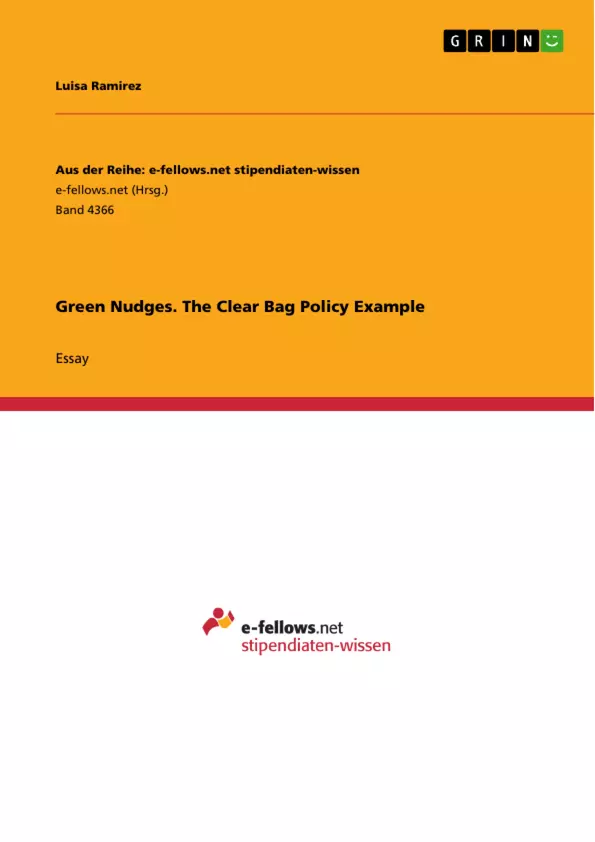Municipal solid waste management is a pressing issue faced by urban municipalities worldwide, with far-reaching implications for public health, environmental sustainability, and community well-being. In response to this challenge, various social policy interventions have been implemented, aiming to incentivize waste reduction and promote responsible waste disposal practices among residents.
This essay delves into the evaluation of one such intervention implemented in a mid-sized urban municipality in Canada: the Clear Bag Policy. Adopted in 2015, this policy leveraged the principles of behavioral economics, employing a "green nudge" to influence households' recycling and waste disposal behaviors. The effectiveness of this policy was analyzed in a study conducted by Yuksel & Boulatoff (2020), who examined its impact on household waste management practices and explored the moderating influence of socioeconomic factors across different neighborhoods.
The significance of this intervention extends beyond its immediate goal of reducing municipal solid waste. Municipal waste management is intricately linked to social health and community well-being. Inadequate waste disposal practices can lead to environmental pollution, posing risks to public health and exacerbating urban living conditions. By addressing waste accumulation and promoting responsible waste disposal, the Clear Bag Policy aimed to mitigate these adverse effects and foster a cleaner, healthier urban environment.
Through a critical evaluation of the Clear Bag Policy and its implications, this essay seeks to derive actionable policy recommendations informed by empirical evidence and insights from the study by Yuksel & Boulatoff. By identifying the policy's strengths, weaknesses, and areas for improvement, policymakers can refine existing interventions and develop targeted strategies to address the complex socio-environmental challenges associated with municipal waste management.
In the subsequent sections, this essay will provide a comprehensive analysis of the Clear Bag Policy case, evaluate its effectiveness in achieving waste reduction objectives, and propose policy recommendations to enhance its impact and sustainability. By examining the intersection of social policy, environmental sustainability, and community well-being, this essay aims to contribute to the ongoing discourse on effective waste management strategies in urban settings.
Inhaltsverzeichnis (Table of Contents)
- Essay's aim and purpose...
- Evaluation and Derived Policy Recommendations
- The Clear Bag Policy Case and its Lessons
Zielsetzung und Themenschwerpunkte (Objectives and Key Themes)
This essay aims to evaluate a social policy intervention implemented in a mid-sized urban municipality in Canada to target the reduction of municipal solid waste. The intervention, known as the "Clear Bag Policy," involved using transparent garbage bags to encourage recycling. The essay also analyzes the impact of socioeconomic factors on the policy's effectiveness.
- Evaluation of a social policy intervention aimed at waste reduction
- The effectiveness of "green nudges" in influencing behavior
- The role of socioeconomic factors in policy effectiveness
- Policy recommendations based on the evaluation
- Ethical considerations in social policy interventions
Zusammenfassung der Kapitel (Chapter Summaries)
- Essay's aim and purpose: This chapter introduces the "Clear Bag Policy" and its objectives. It explains the intervention's focus on reducing municipal solid waste and its potential impact on social health and well-being. The chapter also outlines the essay's goal of deriving policy recommendations based on the evaluation of the policy.
- The Clear Bag Policy Case and its Lessons: This chapter provides a detailed overview of the Clear Bag Policy, including its implementation details, target audience, and intended outcomes. It discusses how the policy aimed to encourage responsible sorting and waste reduction through a "green nudge" approach, and highlights the impact of the policy on recycling and refuse rates. The chapter also examines the potential influence of socioeconomic factors on the effectiveness of the policy, particularly in terms of income and education levels.
Schlüsselwörter (Keywords)
This essay focuses on the implementation and evaluation of a social policy intervention aimed at reducing municipal solid waste. It explores the effectiveness of "green nudges" in influencing behavior, the role of socioeconomic factors in policy success, and the ethical implications of such interventions. Key concepts include municipal solid waste, social policy, green nudges, choice architecture, recycling, refuse, socioeconomic factors, and ethical considerations.
- Quote paper
- Luisa Ramirez (Author), Green Nudges. The Clear Bag Policy Example, Munich, GRIN Verlag, https://www.grin.com/document/1450661



